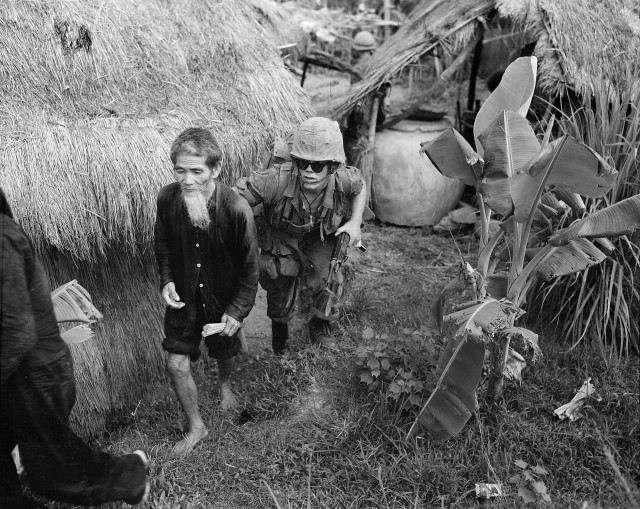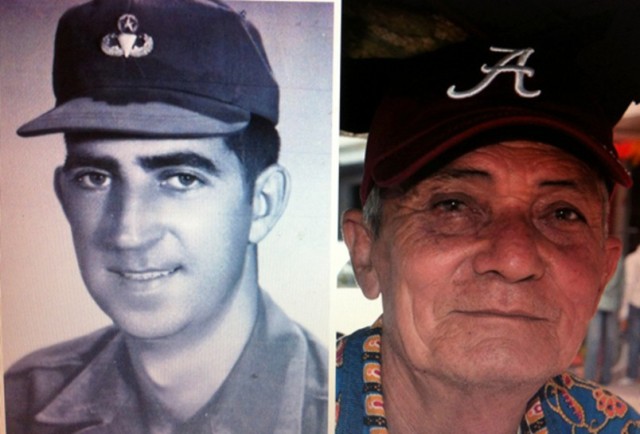On the 25th October 1936, John Hartley Robertson was born in Birmingham, Alabama. He had the nickname Johnny and was one of five siblings born to John Chelsea and Mildred Robertson. His early years were influenced by World War II and he left school as soon as he could to join the military. He eventually ended up, as a Green Beret with the rank of Master Sergeant, in the U.S. Army Special Forces and was later posted to an elite Special Operations Group, Military Assistance Command, Vietnam – Studies and Observations Group (MACV-SOG).
On the 20th May 1968, a helicopter that he was aboard crashed as a result of enemy fire and he was declared Missing in Action. He was formally declared dead, by the military, on the 28th April 1976. He was survived by his wife, Wanda, and two daughters.
His details are engraved on the War Memorial in Washington, but now, if a documentary film, ‘Unclaimed’, is to be believed Johnny Robertson has been found alive and living in a village in Vietnam.
The producer of the documentary, the critically acclaimed Michael Jorgensen, was approached by Tom Faunce, himself a Vietnam veteran, with the story of a man he had been told about in 2008, whilst on a humanitarian mission. He had tracked down a man, locally rumoured to have been a Green Beret, that had never returned home. Faunce had interviewed the man, and grilled him on his story but had come away convinced that the man could indeed be the missing Special Ops soldier, John Robertson.
Jorgensen was very sceptical about the story of a soldier listed as MIA and then declared dead, living in Vietnam, under an assumed name, with a new family, remembering nothing of his past life and now suddenly being named as John Hartley Robertson. Not being entirely convinced by Faunce, Jorgensen undertook his own research into the story and found some confusing facts. As long ago as 1982, rumours circulated around Robertson’s alleged survival, but his family were never contacted, by the military, to assist in identification.
The U.S. government were apprised of this man in 1991, and in 2006 they tried to identify him, with no result. Then in 2010 he was fingerprinted by the U.S. Embassy, but according to them there was insufficient evidence to suggest that he was Robertson, but as Jorgensen pointed out, there was insufficient evidence to confirm that he wasn’t. Again, the family were not requested to help with identification.

The film makers tracked him down to a little village in south-central Vietnam where they found a 76 year old man, suffering from the onset of dementia, living under the name Dan Tan Ngoc with a Vietnamese wife and family. He claimed to have no knowledge of his life in America and could not remember his native language, English, or his date of birth.
Ngoc told Jorgensen that when his helicopter crashed in flames he was captured by North Vietnamese soldiers and locked in a cage, high in the forest. He was starved and tortured and regularly beaten by his guards but escaped after four years. He was found in a paddy field by the woman, who became his wife, and she nursed him back to health. He had no recollection of whom he was or where he came from so he took the identity of her deceased husband and became, Dan Tan Ngoc, a French-Vietnamese resident.
The film crew, fulfilled Robertson’s dearest wish to be reunited with his American family and they flew him back to Canada for a meeting with his only surviving sibling, his sister, Jean Robertson Holly. The Toronto Star reports, ‘Jean says… “There’s no question. I was certain it was him in the video, but when I held his head in my hands and looked in his eyes, there was no question that was my brother.” DNA testing would prove this beyond a shadow of a doubt, but Jean refused to undertake the test, saying she did not need a test to know that this is her brother. Robertson’s wife and two daughters originally agreed to be part of a DNA test, but subsequently withdrew their agreement. At the family reunion, Robertson met Jean’s husband, Henry. Robertson told him that he remembered Henry working in a drug store; Henry had in fact worked as a pharmacist for 15 years. When Robertson was shown photographs of his American daughters he broke down, but did not meet them on this trip.
The film crew asked a police officer, Hugh Tran, from Edmonton, who speaks Vietnamese, to act as translator for Robertson. Tran said that Robertson spoke native Vietnamese, with no discernible accent, which made him very suspicious but after the family reunion he too was convinced that Robertson is who he claimed to be.
The film also shows an emotional reunion with one of Robertson’s trainees from 1960. The man claimed he recognised Robertson immediately.
Finally a DNA test was done in 2014, proving conclusively that Dan Tan Ngoc could not be John Hartley Robertson. Robertson’s family stubbornly stick to the belief that Ngoc is their missing relative, and his niece, Cyndi Hanna, said the result of the test was “very disappointing.” The family base their supposition on the result of an oxygen isotope analysis performed by IsoForensics Inc., in Salt Lake City, on one of Robertson’s teeth. The test results indicated that it was ‘very likely’ that the owner of the tooth grew up in the U.S. The family have started raising funds for Robertson’s repatriation and for more detailed DNA testing.
Could there have been an error? Absolutely, tests are administered by humans so errors are possible, but is it probable? Not really, but the family seem determined to see this through to the end. As his niece told Stars and Stripes, “We only want to do right by my Uncle John. If that means exploring the possibility that the U.S. government has made a mistake or that the man claiming to be my uncle is actually another lost American and doesn’t know who he is, we intend to seek the truth on our own terms.”
The film premiered in 2013, at the Toronto Hot Docs Festival, and once again it forced the issue of Vietnam Veterans back to the forefront of American public opinion and asked people to, once again, examine the lives of the Vietnam Veterans, and what warfare cost them and their families.
Unclaimed Trailer

